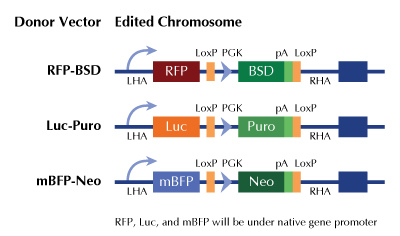CD3E Human Gene Knockout Kit (CRISPR)
CAT#: KN208276BN
CD3E - human gene knockout kit via CRISPR, HDR mediated
Functional Cassette: GFP-puro Luciferase-Puro RFP-BSD
HDR-mediated knockout kit validation
USD 1,657.00
4 Weeks*
Specifications
| Product Data | |
| Format | 2 gRNA vectors, 1 mBFP-Neo donor, 1 scramble control |
| Donor DNA | mBFP-Neo |
| Symbol | CD3E |
| Locus ID | 916 |
| Components |
KN208276G1, CD3E gRNA vector 1 in pCas-Guide CRISPR vector KN208276G2, CD3E gRNA vector 2 in pCas-Guide CRISPR vector KN208276BND, donor DNA containing left and right homologous arms and mBFP-Neo functional cassette. GE100003, scramble sequence in pCas-Guide vector |
| Disclaimer | These products are manufactured and supplied by OriGene under license from ERS. The kit is designed based on the best knowledge of CRISPR technology. The system has been functionally validated for knocking-in the cassette downstream the native promoter. The efficiency of the knock-out varies due to the nature of the biology and the complexity of the experimental process. |
| Reference Data | |
| RefSeq | NM_000733 |
| UniProt ID | P07766 |
| Synonyms | IMD18; T3E; TCRE |
| Summary | The protein encoded by this gene is the CD3-epsilon polypeptide, which together with CD3-gamma, -delta and -zeta, and the T-cell receptor alpha/beta and gamma/delta heterodimers, forms the T-cell receptor-CD3 complex. This complex plays an important role in coupling antigen recognition to several intracellular signal-transduction pathways. The genes encoding the epsilon, gamma and delta polypeptides are located in the same cluster on chromosome 11. The epsilon polypeptide plays an essential role in T-cell development. Defects in this gene cause immunodeficiency. This gene has also been linked to a susceptibility to type I diabetes in women. [provided by RefSeq, Jul 2008] |
Documents
| Product Manuals |
| FAQs |
| SDS |
Resources
Other Versions
| SKU | Description | Size | Price |
|---|---|---|---|
| KN208276 | CD3E - human gene knockout kit via CRISPR, HDR mediated |
USD 1,657.00 |
|
| KN208276LP | CD3E - human gene knockout kit via CRISPR, HDR mediated |
USD 1,657.00 |
|
| KN208276RB | CD3E - human gene knockout kit via CRISPR, HDR mediated |
USD 1,657.00 |
|
| KN408276 | CD3E - KN2.0, Human gene knockout kit via CRISPR, non-homology mediated. |
USD 1,657.00 |
|
| GA100644 | CD3E CRISPRa kit - CRISPR gene activation of human CD3e molecule |
USD 1,657.00 |
{0} Product Review(s)
Be the first one to submit a review






























































































































































































































































 Germany
Germany
 Japan
Japan
 United Kingdom
United Kingdom
 China
China
